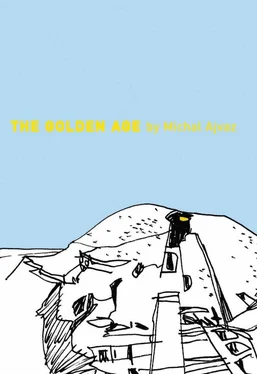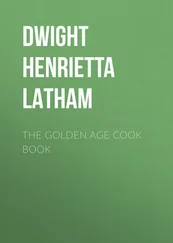Michal Ajvaz - The Golden Age
Здесь есть возможность читать онлайн «Michal Ajvaz - The Golden Age» весь текст электронной книги совершенно бесплатно (целиком полную версию без сокращений). В некоторых случаях можно слушать аудио, скачать через торрент в формате fb2 и присутствует краткое содержание. Год выпуска: 2010, Издательство: Dalkey Archive Press, Жанр: Современная проза, на английском языке. Описание произведения, (предисловие) а так же отзывы посетителей доступны на портале библиотеки ЛибКат.
- Название:The Golden Age
- Автор:
- Издательство:Dalkey Archive Press
- Жанр:
- Год:2010
- ISBN:нет данных
- Рейтинг книги:4 / 5. Голосов: 1
-
Избранное:Добавить в избранное
- Отзывы:
-
Ваша оценка:
- 80
- 1
- 2
- 3
- 4
- 5
The Golden Age: краткое содержание, описание и аннотация
Предлагаем к чтению аннотацию, описание, краткое содержание или предисловие (зависит от того, что написал сам автор книги «The Golden Age»). Если вы не нашли необходимую информацию о книге — напишите в комментариях, мы постараемся отыскать её.
is Michal Ajvaz’s greatest and most ambitious work.
The Golden Age
The Golden Age — читать онлайн бесплатно полную книгу (весь текст) целиком
Ниже представлен текст книги, разбитый по страницам. Система сохранения места последней прочитанной страницы, позволяет с удобством читать онлайн бесплатно книгу «The Golden Age», без необходимости каждый раз заново искать на чём Вы остановились. Поставьте закладку, и сможете в любой момент перейти на страницу, на которой закончили чтение.
Интервал:
Закладка:
I was also perplexed by how the narrator had the girl simply disappear at the end of the story. A lovely solution had presented itself: Baumgarten could have fallen in love with the thief, whose world reminded him of the world of the rooftops, sleeping houses and undersea caves where strangers dwelled, a forgotten world of emptiness, waiting for nothing, and all the bliss these things entailed; the figure of the thief would be identified with Ino Leukothea (naturally it would be better if this were not stated explicitly, but the unity of the two characters be left to the listener to discover), and in this way, too, the analogy of the lettering in the yard and the neon inscription would be emphasized, an analogy into whose force field the smaller motifs of the pearl and crabs’ letters would be drawn, so that these were no longer superfluous ornamentation. The circle of the action might be further sealed by putting in the painting described by the thief a room on whose wall there hung a picture of Odysseus holding on to his raft as he was beaten by the waves.
I wrote that last paragraph, dear reader, late yesterday evening. Now it is nine in the morning and I’m sitting at my computer over a cup of strong, hot coffee. I would be glad if you would try to visualize for a moment the inconspicuous division between paragraphs, the negligible white space between the night-time period applied in resignation and encroached upon by the foam of sleep on the one hand, and the tense and impatient early-morning capital on the other, and to see these as a negative of last night, so that you might summon from this negative all its blackness and push it between the paragraphs. Otherwise what I write here will seem disconnected and illogical to you. All manner of things changed during the night; I lay in bed thinking about what I had written and I realized I had run straight into the trap the Parisian narrator had set for me.
Now I believe I did not understand the story. At the beginning its protagonist encounters the motions of elusive order and chaos, motions that escape from every code they help to appoint. But in so doing they create a curious unity, and any other unity, connection, and circular enclosure would violate the unity introduced at the beginning, while every violation of the unity and connectedness — and the story was composed practically entirely of such violations — would affirm and complement it. This means that everything in the story was exactly where it should be; its connectedness was formed by its disconnectedness and its unity by its fragmentariness.
By now you are perhaps asking yourself, dear reader, why I do not just drop the story told by the Parisian, as I have so many doubts about its veracity. It may seem strange to you, but a lack of veracity in the story is for me a more persuasive argument for telling it here than its veracity would be. All manner of things occur in it, and these are of no special significance, but the fact that the story of the letters is a fiction is surprising at the very least; that someone in Europe is thinking of the same things as the islanders seems to me something almost as unbelievable as a Greek goddess fluttering down towards the hero of the story on a Paris roof.
Board games
I remember the games the islanders used to play. They were fond of board games. The extraction of precious stones from the mines of their homes did not take up too much of their time, and apart from their dreamy attention to the sounds of the water and the murmur of the leaves interwoven with the squawking of birds, apart from their meals and their occasional reading and writing of the Book , they practised only one form of popular entertainment. I would often see them two and two sitting in the shadow of a colonnade in the lower town or on a stone terrace in the upper town, leaning over a game-board. It took me a long time to get used to these games, but eventually I learned to take pleasure in the long, puzzling matches with their ever-changing rules and uncertain outcomes. Even today when the rain keeps me in my Prague flat on a Sunday afternoon, I fold out the game-board I brought back from the island and challenge myself to a game. (I have failed to find anyone here who finds amusement in the islanders’ games.)
The games, too, gave vent to the islanders’ fascination for things which for us do not even exist. By this I mean the shapes of the formless and the surfaces of boundaries. It was as if these games had been born out of the need to create new borders while disputing their existence. The borders were not violated in the name of some kind of (primary or definitive) continuity or freedom. In referring to the islanders’ love of the formless I have allowed myself to be ensnared by language. The fact is that the islanders had no notion of continuous or formless : where we say formless they used a word whose literal meaning is “the dance of demons and animals in the early morning and evening.” For the islanders, even a white surface was a vortex of nascent and expiring shapes, full of monsters and fantastic fauna and flora; while the real bodies of humans and animals and real flowers were for them produce of a single species which exercised no particular privileges in relation to other species. And the gaps between species were not for them, as they are for us, so much empty space into which a monster will occasionally stray: they were inhabited by a great number of beings, whose bodies assumed all manner of transitional shapes. The islanders were well aware that such creatures do not occur in the real world, yet for all that they thought them no more bizarre than real species (not least the animals I told them about; they considered the distinction between existence in words and existence in the imagination a negligible one).
In the beginning I was exasperated by the fact that all the boards on the island were — to differing degrees — out of focus. At first glance you might mistake one for the common type of board we use, but the dividing line between two squares was blurred, and for at least a fraction of a second a moving piece would pass through an area which was neither white nor black but was so much part of the game that it needed to be taken into consideration. Elsewhere on the board there might be a zone in which several squares had indistinct edges; this would put me in mind of a volcano spewing an ever-changing molten lava which, before it was solidified in the black-and-white squares, dreamed wild dreams about games of sameness and difference. There were boards on which all the borders were blurred and boards on which all the squares had practically dissolved. (The surface of the latter was grey with lighter and darker areas which recalled a world of borders.)
Some of the island’s game-boards attained such a state by a process of natural development. I often saw islanders playing with boards which must once have been standard, European chessboards but on which time had worked to erase or obfuscate borders, to lose them in a confusion of lines and a swamp of stains; the board was flaking, crumbling, dripping wet, its squares had paled in the light of the sun, had peeled off, developed cracks, its colours had run into one another, washing over the web of scratches wrought by all the moves and the stains left by all the liquids which had seeped into its pores over many years. The islanders sat over such boards and moved about them decaying pieces thick with mould, with which they wandered the labyrinths of scratches and stains; it was never quite clear to what extent they were searching for traces of squares long-gone or how far their moves and stops were forming a new game-board web both fanciful and vague. Often a game was in progress when the pieces disintegrated to irrecoverable effect; the players would gather together the dust which was all that remained of them, and, after the wind blew this away, continue the game using imaginary pieces. As the end approached there were more imaginary pieces than real and the game crossed seamlessly into the realms of memory and night-time dreams, becoming a game of phantoms.
Читать дальшеИнтервал:
Закладка:
Похожие книги на «The Golden Age»
Представляем Вашему вниманию похожие книги на «The Golden Age» списком для выбора. Мы отобрали схожую по названию и смыслу литературу в надежде предоставить читателям больше вариантов отыскать новые, интересные, ещё непрочитанные произведения.
Обсуждение, отзывы о книге «The Golden Age» и просто собственные мнения читателей. Оставьте ваши комментарии, напишите, что Вы думаете о произведении, его смысле или главных героях. Укажите что конкретно понравилось, а что нет, и почему Вы так считаете.












